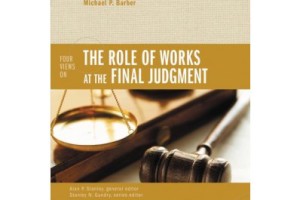Over the last few decades, our precious protestant friend Justification has received a lot of tough press and some heavy abuse. Stendahl, Sanders, Dunn, and Wright have all added their contributions to the theological boxing tournament seeking to knock out an understanding of justification (esp in Pauline Literature) that may be more informed and conditioned by the questions and circumstances of the Protestant Reformation than by seeking to understand what Paul himself really sought to relay to us.
Yet, the air of the controversy around Justification continues to prove that Justification remains a pretty popular doctrine, to make an understatement. As a central subject of Paul’s writings, and as a critical component of Soteriology, the length and the fierceness of the New Perspective Battle shows how important Justification is. Regardless of what one’s definition becomes of it, Justification is certainly a “lead role” doctrine in the stage of theology.
But now, for reasons completely unrelated to the debate that seeks to define Justification, this dogma is now being asked to surrender its celebrity status.
In his article “Spiritual Formation as a Natural Part of Salvation,” Dallas Willard suggests that the heightened emphasis and attention the doctrine of Justification has received for 2,000 (but especially 500) years has actually directly contributed to the struggles the believer faces in the area of sanctification and spiritual formation. Why do we have so many complacent or sluggish believers in the Church today? Why do the Scriptural promises of sanctification seem to sludge along so sluggishly in the lives of many “saints?”
Willard explains his concern:
“The background assumption is that justification is the entirety of salvation, that is, if you are justified, your sins forgiven – then you are saved and you will be okay after your death. I submit to you that this is what is offered…by most current efforts (evangelism) to convert people to Christianity, and it is what people generally understand to be essential to the transaction.”
So, what is wrong with this assumption? Willard explains that when salvation becomes boiled down to the same thing as justification (which is to emphasize that at conversion one is saved from sin and assured of eternity in heaven by God’s decree of righteousness), that the entire expectation – or even the notion – of sanctification is eclipsed. When Justification is done, it is done. “Salvation” is complete. Now with the rest of our lives ahead of us, we can metaphorically “try to get back home to catch the second half of the Sox game.” To quote Willard, “a view that takes salvation to be the same thing as justification…cannot come to see spiritual formation as a natural part of salvation” (italics in original quotation). If we teach and proclaim salvation as simply justification, we omit any picture of spiritual formation and an expectation that the life thereafter is to be lived unto Christlikeness.
What Willard then suggests is that another doctrine needs to be brought up from the historical chorus of the Soteriological cast and given a microphone as a lead character – regeneration. This doctrine does have spiritual formation as a natural part of, or natural result of, “salvation.” This doctrine communicates a picture of coming to life from what was once dead, and a life that going forward is to be radically different than the state of death that existed before. We have “passed out of death into life, because we love the brothers. Whoever does not love abides in death” (1 John 3:14).
So, is Willard on to something? I want to first say this, that the historical and theological context of this article, which comes at a time in history when Dallas Willard and others (Richard Foster, Eugene Peterson, James Houston, John Coe, Steve Porter, and even theologians like J. I. Packer) have been trying to rediscover what sanctification and living a life in the Spirit looks like for the modern believer. Spirituality is a term of great ambiguity to the believer this side of the Enlightenment and the age of modernity. And as a perusal of almost any major Systematic Theology will reveal, fields such as Pnematology have long been sitting in isolation and neglect of the Pastoral and Academic community. So, in the interests of analysis and discovery in the midst of the Spiritual Formation Movement, this idea has at its heart the attempt to identify reasons for why many disciples simply don’t seem to be concerned, or successful, in living a life that looks more and more like Christ after conversion.
Secondly, Willard’s point is not that Justification needs to be abandoned or hidden altogether (I hope that my effort at a ‘play’ analogy didn’t seem to overstate this). It is simply that in the birthday balloon bundle of Soteriology, perhaps the massively dominating volume of the Justification balloon needs to have some helium released, and filled instead in some of the other balloons, especially those like regeneration that bring with them a picture of the implications for the life here on earth after the moment of conversion.
Now, is Dallas right? Dog-gone, although I am always reticent to show agreement to anything that says something as crucial as Justification needs to simmer down, I would say that perhaps he is. And he isn’t the only one to think that. Evangelism Explosion (EE), one of the most popular Evangelism training courses in America, has within recent years released “XEE:” EE for generation X. The major shift in its methodology is not just an emphasis on salvation from sin’s judgment and eternal security, but an emphasis on eternal life, life that is qualitatively different and realized today, as much as it is a promise of everlasting life tomorrow.
Many of Evangelicalism’s heroes trumpet “the Gospel” as the answer to almost everything in life. Yet in my memory, most of these teachers apply the Gospel to Spiritual Formation by saying that contemplation of the Cross and the Resurrection gives us the humility and the joy to spur us on towards sanctification. And they should. But I know that one thing I intend to try in my own devotional life is that when I take myself to a place of meditation on what was accomplished on the cross, to reflect on the diversity of the transformations that occurred at Calvary, and to make sure that my recollection of my salvation have equal integration of the many petals of salvation’s beautiful flower.





10 Comments
Leave your reply.